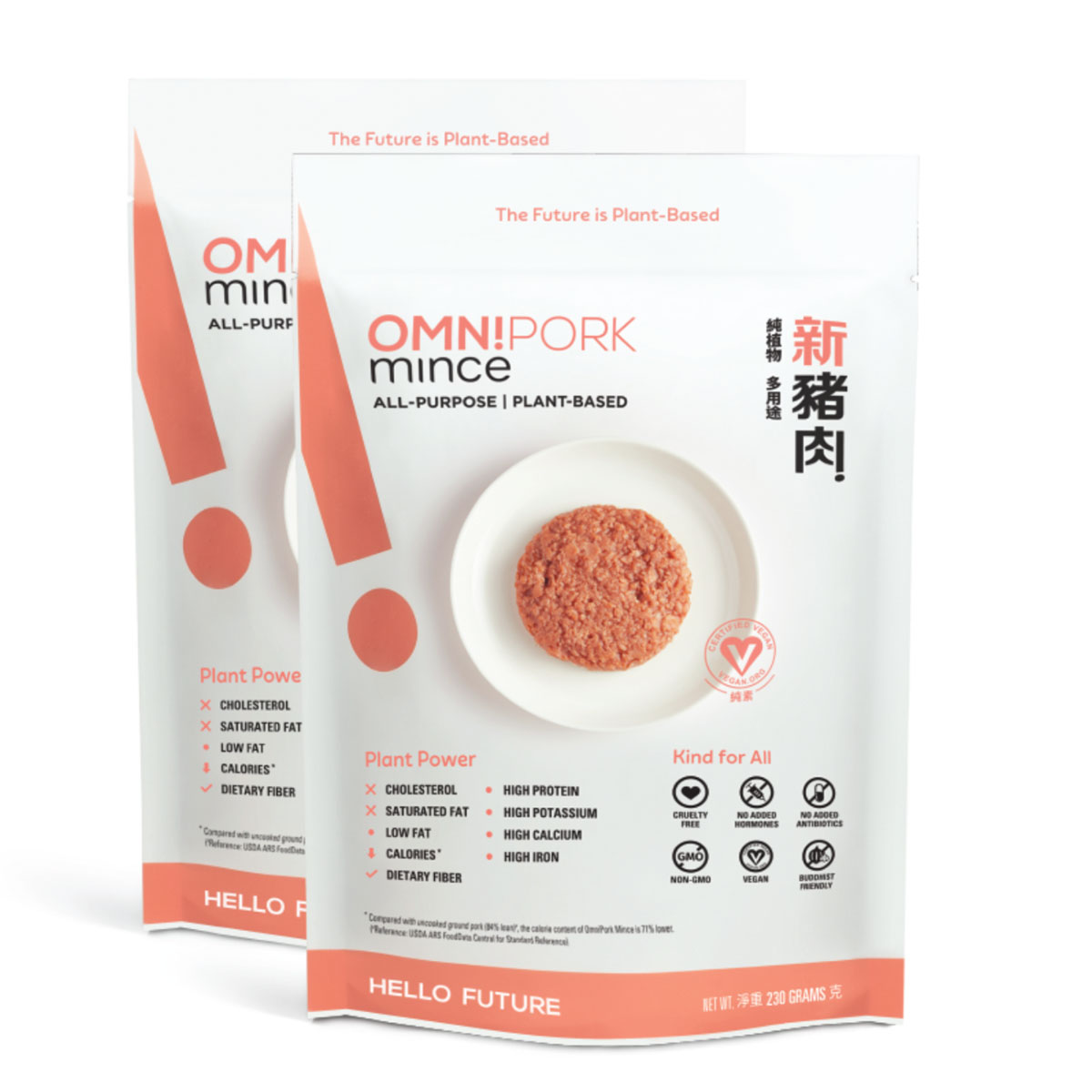September 20, 2022
From dumplings stuffed with plant-based pork, to bean-based protein mooncakes, plant-based offerings in China are growing rapidly. Madaline Dunn explores the startups disrupting the meat industry in China.

Research from consulting firm BCG reveals that switching to more plant-based diets could be the answer to China’s sustainability issue. Its ‘Food for Thought’ report found that a shift to beef, pork, chicken, and egg alternatives would save more than one gigaton (Gt) of CO2e by 2035, which is the equivalent of decarbonizing the majority of the aviation or shipping industries.
There are a number of startups within the Chinese market that are working to make this vision a reality and paving the way to a more plant-based China. We’ll walk you through the top startups facilitating category growth in the market right now.
Founded in 2019, Shenzhen-based startup Starfield Food Science and Technology Ingredients was one of the first major plant-based meat companies on the scene in China. It now sells its plant-based products in 5,500 outlets across China, with a portfolio that includes bean-based protein mooncakes, meatballs, and pork alternatives. The startup launched with the goal of nurturing plant-based eating by bringing healthy, tasty, and affordable plant-based meat products to China. It’s also one of the few plant-based meat producers with its own research and development capacities and manufacturing base.

Starfield Food Science & Technology
Starfield’s products were created through technology based on its research in molecular sensory sciences, which uses a plant-based molecular-level Maillard Reaction model to achieve the products’ meaty flavor. Through the Maillard Reaction, the company is also able to cater better to the diverse and regional tastes across China, and appeal to a wider audience. It uses a mixture of non-genetically modified soybeans, chickpeas, quinoa, and microalgae, to achieve the taste, texture, and appearance of its products.
Back in January, the company made history when it launched China’s biggest ever investment fund for vegan protein with a $100 million Series B investment round, which it said it would use to increase both production capacity and R&D capabilities. In a statement, Starfield CEO Kiki Wu said the company will continue to launch more “affordable, delicious, and healthy plant-based green foods” based on plant protein technology and create a better eating experience for its target market of Generation Z to deliver “more sustainable lifestyles.”
The business’s focus on affordability is also demonstrated through the development of the first commercial-scale production facility, which will help it keep its manufacturing and logistics costs low, with the view of passing on these low costs to the consumer.
Beijing-based Zhenmeat, dubbed the ‘Chinese version of Impossible Foods,’ has, alongside Starfield and OmniPork, been highlighted as a top competitor in the space in MarketWatch’s recent report. Meaning ‘precious meat,’ the company, founded by Vince Lu, offers a wide selection of meat alternatives, including plant-based meatballs, beef patties, steak, dumplings, and faux meat mooncakes, made from pea, soy, brown rice, and mushrooms.
When Zhenmeat started out, it was aware that a plant-based product’s taste is a major factor in converting consumers away from meat products. Zhenmeat is tackling this issue by using what it calls its ‘5D-mimic technology theory,” to create meat mimickers that achieve “revivification” of the color, smell, texture, and taste of meat products.

Zhenmeat
Localization has also proven to be a vital component of the commercial success of plant-based products in China, meaning that products need to be made with certain cultures and cuisines in mind. Consequently, Zhenmeat launched with a pork-tenderloin meat alt made with pea and soy protein and, in response to the fact that China consumes 90% of the world’s crayfish, a crayfish alternative made from seaweed and konjac extracts.
China is the world’s biggest consumer and producer of pork. However, the industry recently witnessed significant disruption. In 2019, prices for pork shot up by between 25-30% and, in some cases, went up as high as 50% following an outbreak of African swine fever, which led to the culling of over 100 million pigs. More recently, concerns have been raised about the welfare of pigs after a video of a pig farm from one of China's major hog breeding companies Zhengbang Group, was released showing pigs starving to death. With consumers becoming more climate-aware and health-conscious, Hong Kong-based OmniFoods, the food innovation arm of Green Monday, launched OmniPork in China in 2020.
Hong Kong innovator and activist David Yeung is the brains behind the company, with a mission of tackling the climate crisis, addressing global food insecurity, and promoting public health. OmniPork offers a range of alternative pork products made from soy, pea, mushroom and rice proteins, tailored to Asian taste buds. Its portfolio includes shredded pork, ground pork, pork strips, stuffed buns and dumplings, and spam.

OmniPork
Reporter Madaline Dunn spoke with Green Monday to learn more about how the company is transforming perceptions of plant-based food in China. In a statement to the GPC, Green Monday said:
“Our two product lines: OmniPork and OmniSeafood are currently available in [the] mainland China market. The mainland has a huge demand and consumption of pork and seafood, which creates a huge market potential but changing the Chinese diet, or any diet for the matter, always poses a challenge. Educating consumers on the relationship between food insecurity, environmental crisis and veganism or flexitarianism has been one of our missions since the beginning, as reflected in our motto: “Make change happen, make green common.”
Herotein (previously HeroProtein) came on the scene in 2020 and was the first domestic company in the country to use high-moisture extrusion technology to create its products. With a portfolio including beef and chicken patties, meatballs, minced beef, and chicken nuggets, the startup uses a mixture of soy, peas and wheat and sells its products into restaurants, retail and eCommerce, as well as school dining facilities.
Back in 2021, the Shanghai-based company recruited the former CMO of McDonald’s Taiwan and former Group Vice President at Xiabu Xiabu, Vicky Lee, as CEO to help accelerate growth within the market, and the team also comprises former senior R&D executives from Impossible and Beyond.
From its own research, the company found that 54% of consumers cited health reasons as the main driver behind diet change and in response has created products that have no cholesterol or saturated fats. The company has also launched itself into the hybrid category and is the first company in China to commercialize hybrid plant-cultivated meat products in response to taste and scalability challenges. According to Coco Tse, Vice President of Strategy and Operations at Herotein, hybrid alternatives are projected to be the biggest growth category in China due to their ability to combine taste, functionality, and affordability.
The plant-based category has seen significant growth in China in only a short time and is projected to expand further, reaching $12 billion in the next few years as more and more startups enter the market. Speaking to the GPC, Green Monday said that this sustained growth is largely due to people’s increased awareness of the health issues associated with eating meat. Moreover, the company outlined that in a post-pandemic era, more customers are willing to lead more sustainable lives, are increasingly open to exploring new food products and are looking for brands that they can trust. It appears that this is just the beginning of the plant-based movement in China and the alt-meat industry undoubtedly has the potential to become big business as the country strives to make big environmental changes as a climate superpower.

plant-based China / agriculture emissions / alternative proteins / meat alternatives / plant-based meat / chickpeas / vegan protein / pea / food insecurity
Disclaimer: The opinions or views expressed in this publication are those of the authors or quoted persons. They do not purport to reflect the opinions or views of the Global Pulse Confederation or its members.